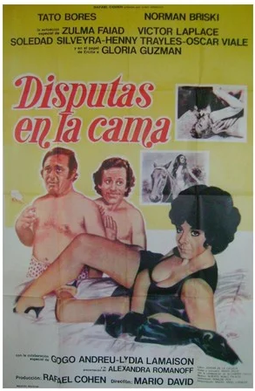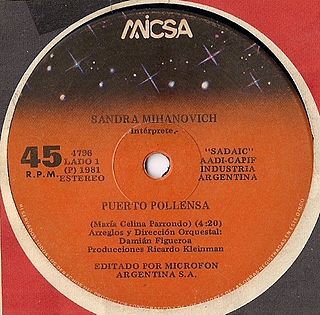Related Research Articles

The following is an alphabetical list of topics related to the Argentina.

Marisela Hernandez, commonly known as Marisela, is a Mexican-American singer. In 1984, she recorded her first album at the age of 18, and continued to release albums into the 1990s. Her cover version of Barbara George's single "I Know ", titled "Ya No", peaked at number-one in the Billboard Latin Songs chart in 1990. As a child she starred in Villa Alegre.

Rosalinda is a Mexican telenovela produced by Salvador Mejía Alejandre for Televisa in 1999. It is a remake the telenovela María Teresa on 1972. Thalía, Fernando Carrillo and Angélica María star as the main protagonists, while Lupita Ferrer stars as the main antagonist.

Alberto Migré, pseudonym of "Felipe Alberto Milletari Miagro" was an Argentine TV screenwriter and producer, specialized on telenovelas.

Laura Ana "Tita" Merello was an Argentine film actress, tango dancer and singer of the Golden Age of Argentine Cinema (1940–1960). In her six decades in Argentine entertainment, at the time of her death, she had filmed over thirty movies, premiered twenty plays, had nine television appearances, completed three radio series and had had countless appearances in print media. She was one of the singers who emerged in the 1920s along with Azucena Maizani, Libertad Lamarque, Ada Falcón, and Rosita Quiroga, who created the female voices of tango. She was primarily remembered for the songs "Se dice de mí" and "La milonga y yo".

Miguel Ángel Solá Vehil is an Argentine actor who has made over 60 film appearances in film and TV in Argentina since 1973. He is traditionally typecast in villain roles.

Disputas en la cama, also known as Los divorciados, is a 1972 Argentine sex comedy film directed by Mario David. It stars Tato Bores, Norman Briski, Zulma Faiad, Víctor Laplace and Soledad Silveyra. A preview function with 250 guests for the film was suspended by the Qualification Body, which objected to scenes with Soledad Silveyra and Alejandra Romanof. Upon release on 11 May 1972, the film was largely panned by critics but was a box office success.
The Island is a 1979 Argentine drama film written and directed by Alejandro Doria. It was the first Argentine film to be a box office success during the military dictatorship. The film was also selected as the Argentine entry for the Best Foreign Language Film at the 52nd Academy Awards, but was not accepted as a nominee.

Cuidado con el ángel is a Mexican telenovela produced by Nathalie Lartilleux for Televisa in 2008. It is an adaptation of the Venezuelan telenovela, Una muchacha llamada Milagros produced in 1974 by Venevisión. Each episode garnered nearly 5 million viewers daily.

Alejandro Doria was a noted Argentine cinema and television director.
The third annual Altazor Awards took place on March 25, 2002, at the Museo Nacional de Bellas Artes.

Cecilio Madanes was a Ukrainian theater director, set designer, and producer. He was one of the leading figures in Argentine theatre from 1950 through 1960. Madanes founded the Teatro Caminito.
Gasoleros is an Argentine telenovela issued between 1998 and 1999 by Canal 13. It aired at 9:00 p.m. during prime time, Monday through Friday. It was produced by Pol-ka and the original idea was from Adrián Suar. The musical theme of the introduction is Gasolero from Vicentico.

"Puerto Pollensa" is a song written by Argentine singer-songwriter and actress Marilina Ross, first recorded and popularized by singer Sandra Mihanovich, who released it as a single in 1981 and later included it in her album of the same name, released in June 1982 on MICSA, a subsidiary of label Microfón. The lyrics of the song are autobiographical and tell a love affair that Marilina Ross had on the beaches of Puerto Pollensa, a town north of Mallorca in the Balearic Islands.
Marta Bianchi is an Argentine comic-dramatic actress of cinema, theater and television.

Mujer contra mujer is the second and final studio album by the pop duo formed by Argentine singers Sandra Mihanovich and Celeste Carballo, released by RCA Records and Sony BMG in October 1990. Mihanovich and Carballo had already developed successful solo careers before joining as a duo. After collaborating on a successful show in the summer of 1987, they decided to record together and released their first studio album as a duo, Somos mucho más que dos, in 1988. Around this time, Mihanovich and Carballo became romantically involved, although not publicly. Their songs included subtle references to lesbian love, and the nature of their relationship caused much speculation in the media. Before forming the duo, Mihanovich already had two popular gay anthems in her repertoire: her 1981 breakthrough single "Puerto Pollensa", and "Soy lo que soy", her 1984 Spanish-language cover of "I Am What I Am".

The 23rd Annual Latin Grammy Awards ceremony was held on Thursday, November 17, 2022, at the Michelob Ultra Arena, Las Vegas to honour the best musical releases within Latin music released from June 1, 2021, to May 31, 2022. The nominations were announced via a virtual livestream on September 20, 2022, presented by Kany García, Christina Aguilera, Banda Los Sebastianes, Becky G, Yotuel, Criolo, Nicky Jam, Akapellah, Luísa Sonza, Sebastián Yatra and Camilo. The three-hour ceremony aired live on Univision and was hosted by singers Anitta, Luis Fonsi, Laura Pausini and Thalía.
References
- ↑ Teorías y prácticas audiovisuales: actas del primer Congreso . Marina Moguillansky, Andrea Molfetta - 2010 - los siguientes títulos y directores: Alejandro Doria, La isla (1979), Los miedos (1980), Los pasajeros del jardín (1982); Adolfo